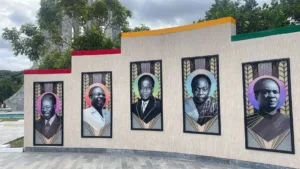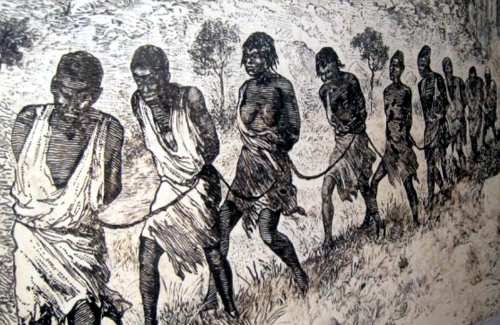“Mother!
Where did I come from?
When will I wear long trousers?
Why was my father jailed?”
The series of rhetorical questions posed above marks the unexpected awakening of an African boy, as depicted in Oswald Mbuyiseni Mtshali’s poem, “Boy on a Swing.” The poem, set against the backdrop of South Africa’s apartheid era, vividly depicts the harshness of the apartheid system as well as black indigenous’ never-ending battle for liberation. During this period, black people endured harsh persecution, with limited or no rights within the government, amidst rampant racial discrimination and segregation from the white population. Many courageous activists in South Africa were imprisoned for their unwavering protests and fight for a society free from racial prejudice.
Can you imagine being in the shoes of the Boy on a Swing? Or perhaps in the shoes of any victim of the Transatlantic slave trade? It’s a deep exercise in empathy. Similarly, consider stepping into the footsteps of the African heroes who fought heroically for the freedoms enjoyed today – their legacy is one of enduring pride and resilience. This is to remind you that, in the quiet corners of history, there is a chapter tainted with the blood and tears of millions – the Transatlantic Slave Trade. Today, as the world observes the International Day of Remembrance of the Victims of Slavery, let’s embark on a journey through time and reflect on the stories of resilience, resistance, and freedom.

As observed annually on 25th March, the International Day of Remembrance of the Victims of Slavery and the Transatlantic Slave Trade was established by the United Nations to honor the millions of individuals who suffered and died as a result of slavery and the transatlantic slave trade. The day serves as a reminder of the atrocities inflicted on enslaved individuals and the long-term effects of slavery on cultures around the world.
The Transatlantic Slave Trade, which lasted for over four centuries, involved the forced transportation of millions of Africans to the Americas to be enslaved on plantations and in other industries. This trade not only caused immense suffering and loss of life but also had far-reaching consequences for the social, economic, and cultural fabric of the affected regions. The echoes of the trade still reverberate today, centuries after its abolition. I mean:
It was an era defined by the brutal commodification of human lives,
where bodies were shackled and spirits crushed under the weight of oppression.
Yet, within this darkness, stories of courage and defiance emerged,
blazing the route towards justice and equality.
The International Day of Remembrance thus provides an opportunity for us to reflect on the historical injustices of slavery and to raise awareness about its ongoing legacy, including racism, inequality, and discrimination. It also acts as a call to action against modern forms of slavery and to encourage tolerance, understanding, and respect for human rights.
Across the African continent, there exist reminders of the harrowing legacy of slavery. From the haunting dungeons of Cape Coast Castle in Ghana to the solemn shores of Goree Island in Senegal, these sites bear witness to the atrocities of the past. I don’t know about you, but through the annals of time, I hear the whispers of those who dared to dream of freedom. From the busy shores of Africa to the plantations of the Americas, their voices refuse to be silenced. Each nameless face carries a story of resilience – a testament to the determined human spirit.

As we revisit the days of slavery, we must also confront the uncomfortable truths that linger in its wake. The scars of this dark period continue to shape our societies, manifesting in systemic inequalities and deep-rooted prejudices. Only by acknowledging these truths can we begin to heal the wounds of the past and pave the way for a more equitable future.
READ ALSO: Freedom Jacob to unmask the new six and the secret six
On this solemn day, let us not only remember the victims of slavery, but also celebrate the champions of freedom who fought tirelessly against the chains of oppression. From the fiery rhetoric of Nelson Mandela to the steadfast resolve of Kwame Nkrumah, their legacies remind us that the struggle for liberation knows no bounds.

As Africans, we carry the responsibility of ensuring that the sacrifices of our ancestors are not in vain. We need to recommit ourselves to the fight against all forms of exploitation and injustice. Through education, advocacy, and solidarity, we can ensure that the horrors of the past are never forgotten and that the voices of the oppressed are always heard.
We must also become active and patriotic citizens, holding ourselves and our leaders accountable for the good of our countries and fellow citizens. By actively participating in the democratic process, advocating for justice and equality, and fostering a culture of accountability, we can honor the memory of the victims of slavery and build a future worthy of their sacrifice.
I know the sun will set on another International Day of Remembrance, but may we never forget to carry the torch of remembrance forward, to guide us on the path towards a more just and compassionate world. In the words of Maya Angelou, “History, despite its wrenching pain, cannot be unlived, but if faced with courage, need not be lived again.” Let us face this history with courage, honor the memory of the victims, and strive towards a future where all are truly free.
Published on International Day of Remembrance of Victims of Slavery and the Transatlantic Slave Trade 2024, this article issues a call to action to individuals to remember the victims of slavery and honour the legacy of the transatlantic slave trade.




